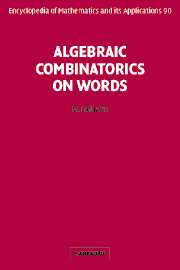Book contents
- Frontmatter
- Contents
- Preface
- Chapter 1 Finite and Infinite Words
- Chapter 2 Sturmian Words
- Chapter 3 Unavoidable Patterns
- Chapter 4 Sesquipowers
- Chapter 5 The Plactic Monoid
- Chapter 6 Codes
- Chapter 7 Numeration Systems
- Chapter 8 Periodicity
- Chapter 9 Centralizers of Noncommutative Series and Polynomials
- Chapter 10 Transformations on Words and q-Calculus
- Chapter 11 Statistics on Permutations and Words
- Chapter 12 Makanin's Algorithm
- Chapter 13 Independent Systems of Equations
- References
- Index of Notation
- General Index
- Frontmatter
- Contents
- Preface
- Chapter 1 Finite and Infinite Words
- Chapter 2 Sturmian Words
- Chapter 3 Unavoidable Patterns
- Chapter 4 Sesquipowers
- Chapter 5 The Plactic Monoid
- Chapter 6 Codes
- Chapter 7 Numeration Systems
- Chapter 8 Periodicity
- Chapter 9 Centralizers of Noncommutative Series and Polynomials
- Chapter 10 Transformations on Words and q-Calculus
- Chapter 11 Statistics on Permutations and Words
- Chapter 12 Makanin's Algorithm
- Chapter 13 Independent Systems of Equations
- References
- Index of Notation
- General Index
Summary
Introduction
The theory of codes provides some jewels of combinatorics on words that we want to describe in this chapter.
A basic result is the defect theorem (Theorem 6.2.1), which states that if a set X of n words satisfies a nontrivial relation, then these words can be expressed simultaneously as products of at most n — 1 words. It is the starting point of the chapter. In Chapters 9 and 13, other defect properties are studied in different contexts.
A nontrivial relation is simply a finite word w which ambiguously factorizes over X. This means that X is not a code. The defect effect still holds if X is not an ω-code, i.e., if the nontrivial relation is an infinite, instead of a finite, word (Theorem 6.2.4).
The defect theorem implies several well-known properties on words that are recalled in this chapter. For instance, the fact that two words which commute are powers of the same word is a consequence. Another consequence is that a two-element code or more generally an elementary set is an co-code. The latter property appears to be a crucial step in one of the proofs of the DOL equivalence problem.
A remarkable phenomenon appears when, for a finite code X, neither the set X nor its reversal is an ω-code. In this case the defect property is stronger: the n elements of X can be expressed as products of at most n — 2 words (Theorem 6.3.4).
- Type
- Chapter
- Information
- Algebraic Combinatorics on Words , pp. 197 - 229Publisher: Cambridge University PressPrint publication year: 2002



